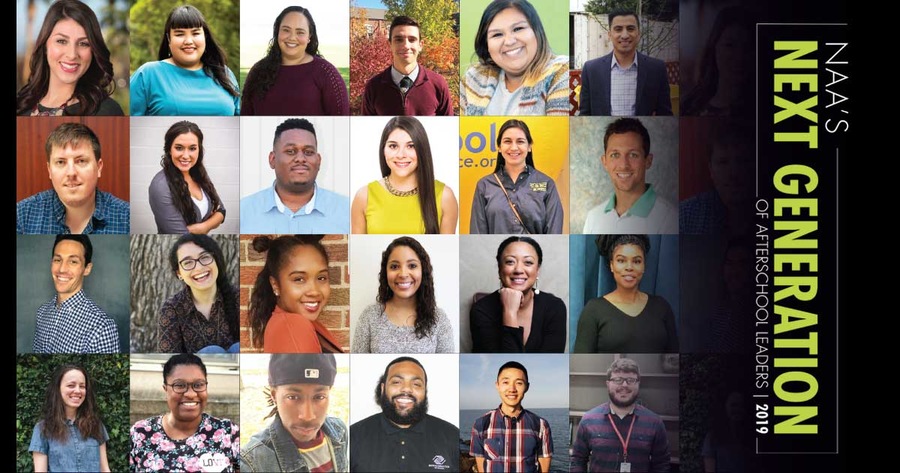In selecting NAA's Next Generation of Afterschool Leaders 2019, the National AfterSchool Association sought to highlight emerging young leaders who are active in the afterschool community—with a proven passion for professional development, influence beyond their program in an effort to elevate the field, and persistence in their work to grow as a leader.
We're pleased to present this year's list of outstanding performers. We hope you share in the excitement about these leaders and how their contributions are shaping the next generation of the afterschool field.
And we hope you'll appreciate their answers to the questions:
"What are you most proud of, regarding the contributions for which you're honored?"
"What immediate impact have you seen from your efforts?"
"What—ideally—are the long-term, bigger-picture results of these efforts?"
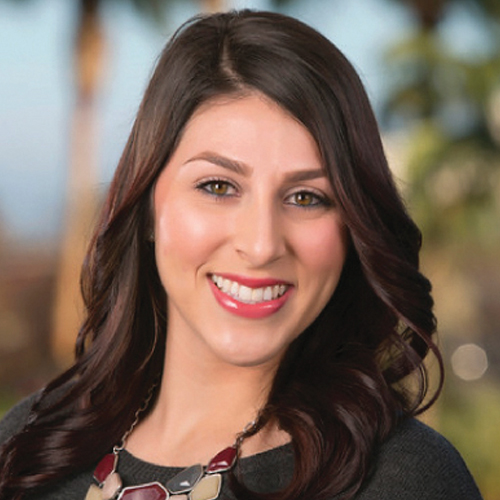 Adriana Soto | Training Manager, California Teaching Fellows Foundation, Fresno, California
Adriana Soto | Training Manager, California Teaching Fellows Foundation, Fresno, California
It's humbling to think that my journey in expanded learning began over 10 years ago and I am proud to say that my passion has driven my commitment to the field for this length of time. Though each position has proven to be a greatly rewarding experience, I am most proud of the opportunity to serve as a Training Manager, supporting and inspiring incoming tutors in the beginning stages of their own professional journey within expanded learning programs. My high school self would have never believed that a major function of my work would involve leading staff training and having the opportunity to share with others my passion and experience. Yet on nearly a weekly basis, I get to translate this passion into energy to be shared with new staff as they themselves are discovering their "why" and realizing the power of expanded learning programs. It has been said that "The things you are passionate about are not random, they are your calling." I am grateful that I get to be a part of an organization that trusts me to follow my calling and lead this initiative.
The immediate impact I see from my efforts is one I find most rewarding. I see staff who have a newfound sense of confidence and understanding of their role—staff who feel supported and who understand the significance of the impact they'll have in the lives of the students we serve. These expanded learning professionals are the linchpin to quality programs. By training staff and providing them the support to strengthen their skills, I am not only taking part in their growth, but these efforts translate into a positive and lasting impact on our youth and in our community. I've been able to see these efforts come full circle, as students from classes and programs that I once led are now the leaders of their own classes and programs.
Through these efforts, we would see a continued lineage of next generation leaders and teachers: "real models" who live in their truth and whose passion drives them to achieve far beyond what they ever imagined. These leaders will be trained in the best practices and driven by innovation to effect change. These are the kinds of leaders that our youth deserve.
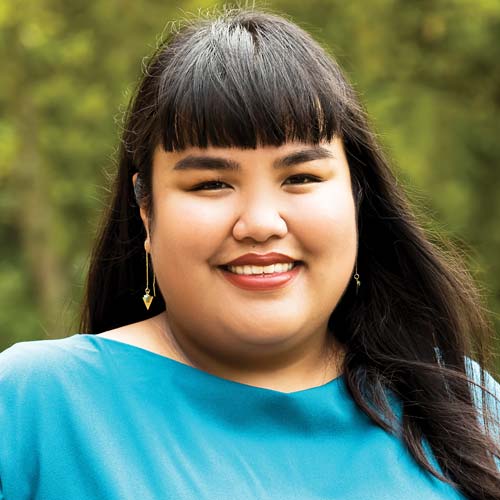 AJ Frigillana | Multicultural and Identity Based Programs Manager, The Richmond Neighborhood Center, San Francisco, California
AJ Frigillana | Multicultural and Identity Based Programs Manager, The Richmond Neighborhood Center, San Francisco, California
I am most proud of the growth that our identity-based programs have gone through in the past three years. My team and I create, manage, and facilitate these programs at two middle school sites and two high school sites in the Richmond District, both after school and during the school day. Our team has brought in 10 high school programs, five middle school programs and one summer program—all dedicated to equity, social justice and youth advocacy.
I believe that the immediate impact that our programming has had is based in youth leadership and advocacy. Our participants are developing skills and collecting tools to view their communities consciously and through a critical lens. For two summers, we've held the Leaders of Color in Training (LOCIT) program, where our young people identify an issue in their community and use the Youth Participatory Action Research model to better understand how they can create change. We have had two cohorts, with 27 participants in total. Many of our past LOCIT participants have not only successfully completed the program but have also gone on to take leadership roles in other programs that we provide.
The ideal long-term result would be that our programs would expand even further throughout the school sites we serve and reach an even larger part of the population. I also hope to see our team's values of equity, critical consciousness, and cultural competence to continue to be at the forefront of all we do in service of our young people and their families.
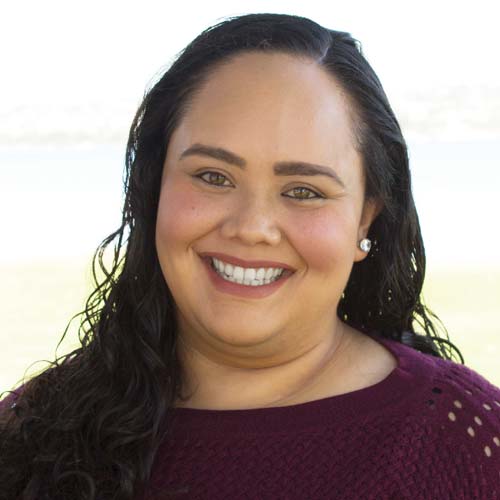 Alexandra Garcia | Assistant Director of Programs, arc, San Diego, California
Alexandra Garcia | Assistant Director of Programs, arc, San Diego, California
Being a first-generation American, English and Spanish were my first languages: My father spoke English and my mother and grandmother spoke Spanish. Being able to fluently speak both languages is something my parents are proud of. What I am proud of is being able to use both languages to help others. Growing up and more so now, I feel a sense of duty to assist Spanish speakers with little to no understanding of the English language. Having been my mother and grandmother's translator as a child—at parent-teacher conferences, doctors' appointments and phone calls with employers—I sympathized with my students when they would try to explain to their parents what teachers were communicating. When I started working in afterschool, no one on staff spoke Spanish; when I came on board, parents appreciated the consistent communication regarding their student's behavior and progress as well as receiving any messages and notes the teachers would provide.
An immediate impact I have seen in my efforts of constantly developing staff would have to be my retention of Site Coordinators in San Diego. The impact is not all due to building systems and providing professional development for staff, but also being able to relate to staff, having previously held positions ranging from program leader to Site Coordinator as well as getting staff to understand the greater responsibility we have as afterschool professionals. I have been able to have some real conversations with staff regarding our purpose and how much impact we have in a student's life: By being there for them before school starts and after school ends, we are that consistent individual who will always be there for students. In some cases, we are the one and only consistent individual in their lives.
Ideally, I want to see students experience and engage in activities that spark interest and broaden their learning beyond the classroom and within their communities.
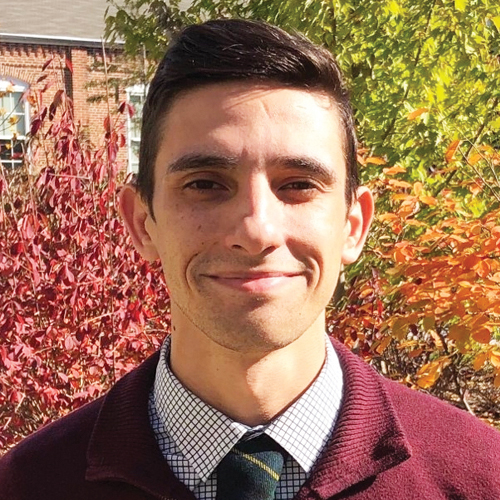 Andrew Neuman | VISTA Project Director, Maryland Out of School Time Network (MOST), Baltimore City, Maryland
Andrew Neuman | VISTA Project Director, Maryland Out of School Time Network (MOST), Baltimore City, Maryland
When reflecting upon what I am most proud of in regards to my work with MOST and AmeriCorps VISTA, the first thing that comes to mind is the gratitude I feel for being accepted into and afforded the ability to support others in the important work that our VISTA program focuses on: expanding and enhancing sustainable youth development initiatives throughout the State of Maryland and the Washington, D.C., area. I was first given the chance to take part in these concentrated community efforts when given my VISTA assignment at the Greater Baltimore Urban League, where I served as a Resource Developer for the Saturday Leadership Program, a college- and career-readiness program for Baltimore City Public School students. Through the heartfelt guidance and support of my hosts at GBUL, I was able to build and test the foundation of my skills and local knowledge, which served to jump-start my career in supporting others in achieving their professional goals, opening doors to those who have come after me, and creating access to opportunity for my state's youth. During my tenure as the MOST VISTA Project Director, I am grateful to have been able to expand our program to geographic and performance levels that have never been seen for our organization. With a current serving VISTA cohort of 27 members in 2018, our program now impacts seven counties—with service sites from the Eastern Shore all the way to the mountains of Western Maryland. The varied scope of our capacity building projects has opened my eyes to the countless innovative approaches that out-of-school programming can take shape as: From STEM to college access, arts to sports, youth leadership to student advocacy, it is a true pleasure to play a small but vital part in the success and expansion of each of these efforts. Lastly, it brings me utmost pride to send off our VISTA members at the end of their service year and to witness the powerful and important roles that they take on in the OST field and beyond.
The immediate impact of my work with the MOST VISTA program can be found in the qualitative and quantitative data metrics that we collect and report upon each year to the Corporation for National Community Service, the federal entity that implements AmeriCorps VISTA and other volunteer initiatives nationwide. Since beginning my current role in January 2017, our VISTA members have collectively raised $636,662 to support program operations, enhance staff capability, support special events, and continue to expand access to allow more participants, particularly for those from low-income and otherwise disadvantaged backgrounds. In addition to these resources developed, our program has leveraged over $300,000 worth of in-kind materials to better serve the thousands of young people our partners work with each day. These results, along with the many other great impacts of our VISTA program—such as fostering an increase in volunteerism among community members, piloting new and exciting OST initiatives, alumni and parent engagement efforts, the development of formal mentoring components, and more—were brought about in part due to my expressed effort to provide ongoing professional development and direct technical assistance to each member and their site staff as well.
The long-term results of this programmatic capacity building work are manifold, but can be most easily truncated into the following outcomes:
- An increase of access to high-quality OST programs for low-income and otherwise disadvantaged youth.
- The provision of exceptional support for leading professionals who already operate in the OST field, allowing them to concentrate on rendering their organizations to be sustainable and their impacts to be long-lasting.
- The opening of doors to individuals who wish to further their careers in community-based work, the OST field, and other related long-term goals, using a guided approach that provides the experience, skills, and applicable knowledge to become invested experts in the youth development, public, and nonprofit sectors.
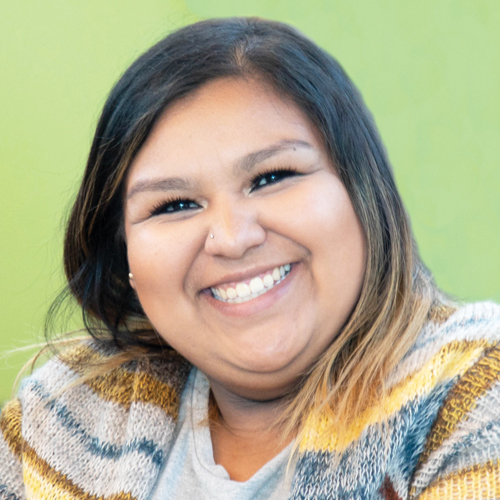 Ayanna Zamora | Assistant Director, Woodburn After School Club, Woodburn School District, Woodburn, Oregon
Ayanna Zamora | Assistant Director, Woodburn After School Club, Woodburn School District, Woodburn, Oregon
Being recognized as a Next Generation Leader, what makes me most proud is being able to serve as a leader in the community I grew up in. Being a part of a multicultural and multilingual student body is so rewarding: You get to know families on a personal level. As a leader, I believe that you need to build a relationship in order to trust. I have built many relationships with my community, staff and students that attend my program. Being awarded as the Next Generation leader has made me appreciate all the work that my team and I put into supporting our working families in my community.
The immediate impact that I have seen in my efforts is watching my programs come together and having a fun, safe place for all students. Students in my program have so enjoyed afterschool club that they ask their parents to pick them up later then when they should pick them up; this shows me that we are doing a great job and they enjoy staying after school. Being able to provide a hot meal and academic and enrichment activities for students every day has really helped our program grow.
My ideal long-term goal is to keep supporting the afterschool programs in my community and state and that one day I can become a Director. I really do believe afterschool programs make a big impact in a student's life. My goal is to make sure every student in my programs leaves with a smile on their face.
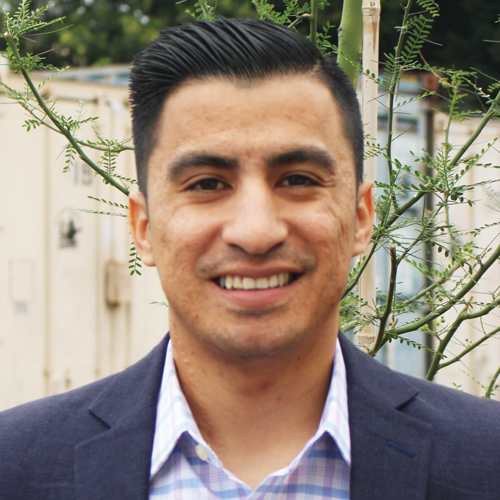 Daniel Monterroso | Staff Development Coordinator, LA's BEST, Los Angeles, California
Daniel Monterroso | Staff Development Coordinator, LA's BEST, Los Angeles, California
My proudest achievements all stem from being part of a values-based organization dedicated to creating experiences and opportunities for the students we serve. The nature of the work we do affords anyone who is truly committed to feel they are doing meaningful work and contributing to creating a brighter future for our students. We practice what we believe by encouraging staff like myself to take on new roles and develop homegrown skills—like how I have learned to develop digital content. I would be remiss not to mention that I am proud of being part of a Staff Development team that is consistently responsive to the field and committed to creating opportunities for staff to connect and grow, in face-to-face trainings as well as through digital content. Lastly, I am proud to say that through this process we've been able to hold true to our values and develop content that is authentic, genuine, relevant, and applicable to our staff and students.
We've been able to take the communication and cohesiveness between our sites and leadership staff to a whole new level. We ventured to develop digital content and, in turn, were able to maximize our staffs' time by creating engaging online videos not only viewable by staff, but by their students as well. This has been an opportunity to prepare staff and students side by side for various Enhanced Programs, such as Speedometry.
We hope to continually take our support and communication to new levels. We aim to create systems that incorporate feedback from staff in real time, which ideally leads to real-time support. We strive to create channels of support for staff and students not only from leadership, but from their peers as well. All this to be complemented by a resource hub that is intuitive and provides a comprehensive list of resources that further enhance our staff and students' experience in Expanded Learning at LA's BEST.
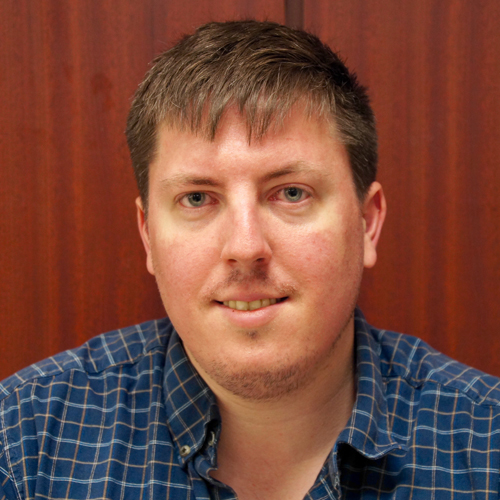 David Trigaux | Program Director, Washington Urban Debate League, Washington, D.C.
David Trigaux | Program Director, Washington Urban Debate League, Washington, D.C.
I am most proud of the hard work, dedication and intellectual growth the Washington Urban Debate League has inspired in our students. So many young people are looking for a spark that engages them; something they often aren't getting from their formal educations or at home. At some point, adults can't educate students if the students don't buy in; being able to inspire and interest students in learning is the greatest achievement. Once that spark is lit, a million doors start opening—and anything is possible.
A second thing I am extremely proud of is our young women. When I was debating in high school, there was a single young woman who would ever get trophies in our circuit. The WUDL is more than 60 percent women and they are over-represented in terms of their competitive achievement. They took home 70 percent of the trophies this past weekend and 4/6 of our qualifiers to nationals last year were women. The future is female! I'm glad we're providing a place where young women can hone their skills and gain confidence for their future endeavors.
We have seen a lot of growth of the big, measurable impacts:
- GPA increases. Most urban debaters graduate with a 3.23; their peers, even when controlling for selection bias, have a 2.8.
- Standardized test score increases. 10 to 27 percent depending on the subject, including STEM courses.
- Students getting into and progressing through prestigious colleges. WUDL has a 100 percent graduation rate for seniors who debate. Many gone on to prestigious universities such as Yale, Michigan, Rochester, Simpson and Howard, to name a few from this year's class.
- Improved attendance and disciplinary records.
For me, the bigger achievements are smaller and not captured by these big metrics: A student saying his teachers now have expectations for him, because he keeps winning debate trophies; a student pulling his GPA up from a 0.73 after sophomore year to a 2.89 upon graduation; a student who has been homeless for most of the last semester winning his first trophy. The big numbers don't capture stories like these, but this is really what tells me I'm making a difference—when students start believing in themselves and unlocking the potential they have, but weren't embracing yet.
D.C. is really a tale of two cities: the much more affluent, younger, whiter, and rapidly gentrifying western half of the city that mostly wasn't born in the region, and the traditionally African-American neighborhoods and immigrant communities that gave D.C. its "Chocolate City" nickname. This rapid gentrification is inevitable to some degree, so students need to be given the skills and confidence to compete and participate in the city's future labor market and political life. We're proud to do our part to help even the playing field for the future and ensuring a high-quality education is available for everyone in D.C.—not just for those investing $40,000 a year in the city's private schools.
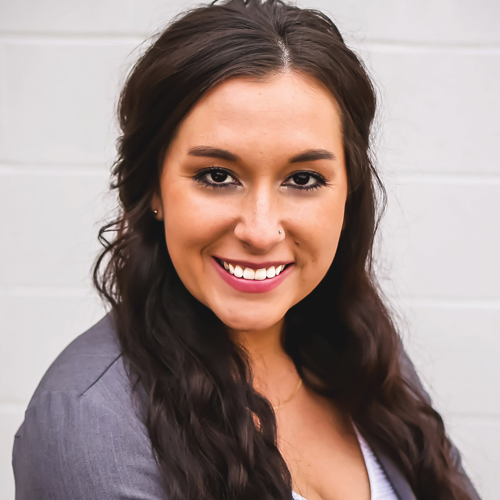 Dawn Marie Johnson | Summit 21st CCLC OST and Summer Enrichment Director, Summit 21st Century Community Learning Center, Summit, South Dakota
Dawn Marie Johnson | Summit 21st CCLC OST and Summer Enrichment Director, Summit 21st Century Community Learning Center, Summit, South Dakota
I am the Director of Summit's 21st Century Community Learning Center Out of School Time and Summer Program. I was sought out by Summit School District when they were awarded the 21st Century Grant to start, build, grow, and host a successful afterschool (aka OST) and summer program. I oversee 12 staff members, uphold the Department of Social Services policies as a licensed childcare provider, and ensure we are meeting grant standards. Outside of those duties, I host numerous successful community events each year. Since 2016, I have helped double our attendance in our afterschool and summer program, have been selected as Summit's community member of Spring 2016, have been nominated to apply for the Annie E. Casey Foundation Children and Family Fellowship, had our OST and Summer Program selected to be highlighted in a final case study for the Department of Education in 2018, and was accepted in Advanced Standings to pursue my Master of Social Work through the University of South Dakota. I completed my first semester last summer and achieved a 4.0 GPA. My journey of education began in 2008, when I was one of the first of my extended family to attend college. I am a co-founder of Children's Health Always Matters Partnership (C.H.A.M.P.), serve on USD's Social Work Advisory Board annually, and take an active role in South Dakota School Age Care Alliance (SoDakSACA) group that advocates for afterschool programs and communities.
The community I serve is a rural town with a population of 288. We have a diverse population of Caucasian, Hispanic and Native American people. Resources in this area are minimal. We like to joke about having to drive 45 minutes for groceries, but it is the reality of our living. In fall 2017, our afterschool program enrolled 111 out of 156 students in the school. Out of those 111 students, 80 of those qualified for free and reduced lunch. What these statistics say to me is that we have working and non-employed families living in our communities who deal with financial and hunger hardships. In fall 2017, we averaged 55 to 65 students that attended our afterschool program each day. This is due to various reasons. First, our program provides a safe space, enrichment, and a free snack Monday through Thursday for students 5 to 17 years old and is the only establishment that is free in our area. Second, for parents and guardians who work longer than regular school hours, the only option is to trust that their children are safe at home or they pay for daycare. Last, our program provides opportunities and activities that students would not usually get to experience living in a rural area. Our grant requires us to report on our academic, physical fitness, STEM, arts, community service, and college and career readiness. I take pride in the fact that we have completed many community service projects in our area. Since the start of our program in 2016, students seventh to 12th who regularly attended our afterschool program averaged 50-plus hours of community service every year. Projects such as community cleanup, volunteer work for events, leading clubs, painting benches, volunteering at nursing homes and humane societies, and so on, make a significant impact in small communities.
Working with the students and staff to promote change and service requires more than being a leader. The connection I have acquired and maintained with the students, staff and community has a substantial impact on their life. I strive to assist them in developing stronger beliefs in their own power and I hope to provide them with a bigger picture of their lifetime influences. The opportunity I have to take action, make meaningful contributions and make connections is less about my position and more about my inherent quality to do right by the people around me.
Specific goals for myself would be for those I hire to feel like they could walk away from their experience working with me as a better leader. As for students, I want to build a respectable program that sets them up for success and provide them with life skills and knowledge to take ownership of their decisions. Lastly, another goal of mine is to produce community programs that are self-sustaining, self-reliant and confident in their ability to build on community assets. If I obtain the skills to build confidence in my staff, teach lifelong skills to youth, and develop programs that are self-sufficient, I would be able to ensure a healthy community that will produce healthy people long after I am gone.
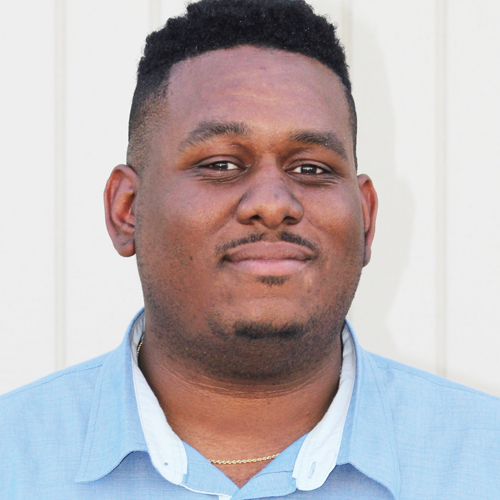 Gionovan Bean | Program Manager, Sacramento Chinese Community Service Center, Sacramento, California
Gionovan Bean | Program Manager, Sacramento Chinese Community Service Center, Sacramento, California
I am most proud of my efforts toward leadership development, both with the students in our program and the Emerging Leadership Collective (ELC). Intentionally fostering youth voice and leadership in program not only allows students to participate in and develop a program that is catered to their needs and interests, but also provides students the opportunity to develop their skills as leaders through mentoring and reflection. The Emerging Leadership Collective takes the concept of mentoring and reflection a step further by also fostering a network of expanded learning professionals who are able to share resources and tools that allow them to develop their skills as leaders in the field.
The immediate impact I have seen from these efforts has been strong relationship building among the various participants across grade levels, school districts and school sites. Both students in the program and participants in the Emerging Leadership Collective develop more confidence in their abilities. I personally also feel more inspired as well as more confident, because I have the opportunity to learn from the students and participants of the ELC. By serving as a mentor, I am able to add to my toolkit of recourses. There is a strong sense of connectedness and community that is cultivated through these efforts of mentoring.
It is my hope that the growth opportunities and inspiration that is experienced by participants in the collective and student in program doesn't stop there, but reaches individuals on all levels of the expanded learning field, from students to administration. The results that we would like to see from these efforts look like a chain reaction of leaders sparked by one leader who inspires a group of future leaders in their community, who in turn inspire even more future leaders in other communities, strengthening the field of expanded learning on all levels. As we develop our toolkits, it is important that we remember the responsibility of passing on our knowledge to others.
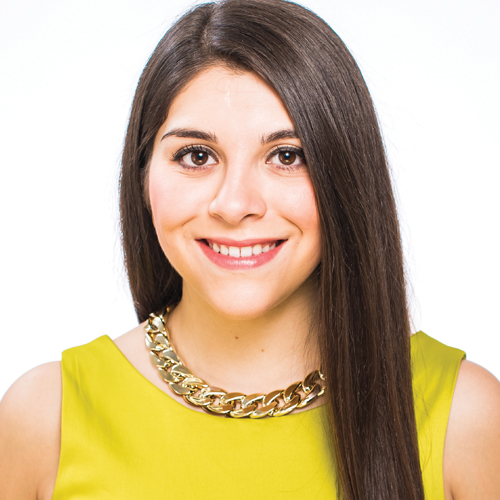 Itzel Gutierrez | Program Coordinator, Girlstart, Austin, Texas
Itzel Gutierrez | Program Coordinator, Girlstart, Austin, Texas
I am very proud to be part of the Girlstart team that develops and implements innovative education programs to promote girls' engagement and academic success in STEM in order to incubate a talented and diverse STEM workforce. It's a privilege to be responsible for planning, developing and supporting Girlstart's program replication in new communities. Girlstart currently serves 2,000-plus girls in 91 afterschool programs in Texas, California, and Massachusetts, and I'm excited to work toward expanding our reach. Furthermore, I love being able to train and manage a growing remote team of 40-plus female college interns and certified teachers who lead Girlstart's satellite programs and spark the interest of young girls in STEM.
I see our college interns and the young girls in our afterschool programs become more confident in sharing their ideas, trying new things, and learning from their mistakes. After being part of our programs, 84 percent of Girlstart girls say, "I feel I can be myself at Girlstart" and 93 percent say, "If I do well in STEM at school, I am more likely to get into college."
I hope that by increasing young women and girls' interest and engagement in STEM, we help address the gender imbalance in the STEM workforce and girls become inspired to take on the world's greatest challenges facing us today and in the future.
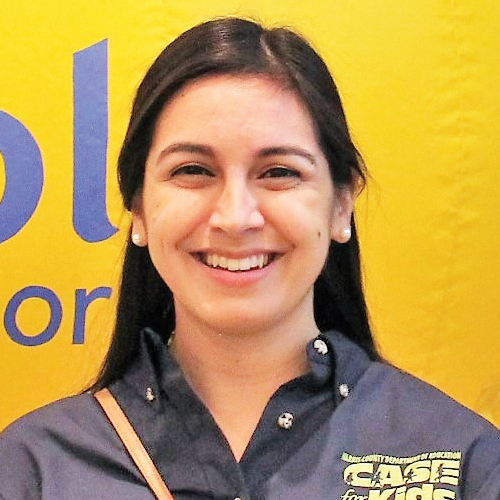 Jacqueline Chavez | Program Coordinator, Harris County Department of Education – CASE for Kids, Houston, Texas
Jacqueline Chavez | Program Coordinator, Harris County Department of Education – CASE for Kids, Houston, Texas
I am most proud of the community of people I get to work with each and every day. They are committed and passionate professionals who have experience working with children from all types of backgrounds. I've been able to work with partners in the community to offer different learning opportunities to kids, including the Kids' Day series. This year, local artists helped kids share their stories and express themselves in different ways at the Hobby Center in Houston. These projects take time to plan and a team effort to execute, but the magic it brings to kids makes it all worth it.
The immediate impact I've seen from my efforts is the motivation and interest from so many afterschool providers to further develop themselves and engage in professional development, in order to provide quality out-of-school time programming for youth. I've built relationships with people and organizations that have a passion to share their own interests and introduce children to many different types of learning, such as art, music, dance, robotics and so much more. It's inspiring to know that in different ways I'm helping staff help the kids in afterschool programs.
The long-term, bigger-picture result of these efforts is to show that afterschool programs are a key component of the overall educational experience today's youth receive. They are given a safe space to learn at their own pace and in their own way. And we have a responsibility to continue finding better ways to improve the lives of kids everywhere.
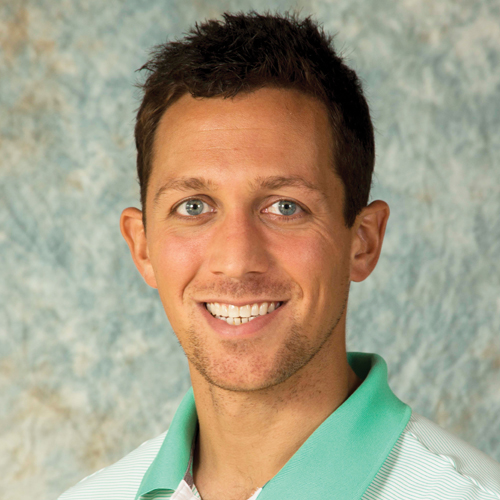 Joseph Moheban and Matthew Moheban | Co-Founders, 220 Leadership, Chicago, Illinois
Joseph Moheban and Matthew Moheban | Co-Founders, 220 Leadership, Chicago, Illinois
We're most proud of what our accomplishments mean. If we're getting recognized for our contributions to afterschool and education, that means what we're doing is working. And if it's working, that means student lives are being transformed and youth programs are excelling in the development of those they serve. The more successful we are, the more youth programs and students we're impacting.
The foundation of our work is based on helping students destroy self-limiting 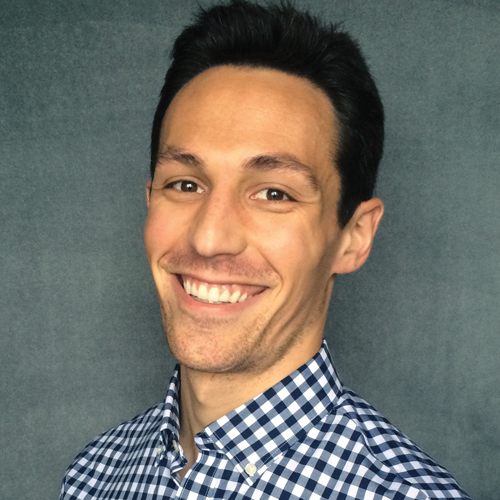 beliefs, set bigger goals, take positive risks, and build their life around their unique passions and skills. One of our favorite ways to measure impact is when students tell us they're willing to set bigger goals and see failure in a positive light as a result of just the first section of the program. For example, one girl recently told us, "Before this I wanted to be a police officer—but now my goal is to be in the FBI!"
beliefs, set bigger goals, take positive risks, and build their life around their unique passions and skills. One of our favorite ways to measure impact is when students tell us they're willing to set bigger goals and see failure in a positive light as a result of just the first section of the program. For example, one girl recently told us, "Before this I wanted to be a police officer—but now my goal is to be in the FBI!"
Our mission is to solve the world's problems by helping people access their unlimited potential. The world's greatest challenges can be solved by individuals taking full ownership over the outcomes of their lives and their communities. We plan to do that by empowering the next wave of entrepreneurs, inventors, creators, scientists and educators that otherwise would have settled for less. If we can build stronger individuals, we create stronger communities. Stronger communities means a better world.
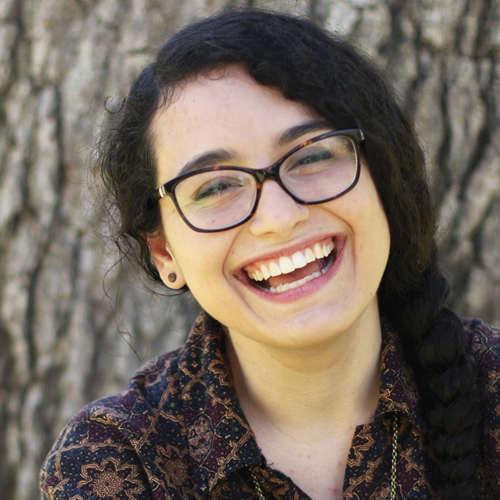 Kaci Fankhauser | STEM Ecosystem Coordinator, Arizona SciTech Ecosystem (officially Arizona Technology Council Foundation), Phoenix, Arizona
Kaci Fankhauser | STEM Ecosystem Coordinator, Arizona SciTech Ecosystem (officially Arizona Technology Council Foundation), Phoenix, Arizona
While Arizona SciTech's established programs are wonderful and impactful, I am most proud of constantly challenging myself and my co-workers to consider people in need of opportunity who are flying under our radar. My biggest accomplishment in this regard was spearheading a connection with the Phoenix International Rescue Committee that most recently resulted in my coordinating a week of STEM programming for refugee middle school students.
The biggest immediate impact I have seen is the growth of the Chief Science Officer (CSO) program on a national and international scale. When I first started working with the organization, the CSO program had just begun its second year in the founding Arizona region. However, I quickly began meeting educators from other parts of the country who were interested in CSOs and I became a resource for national partners who were spearheading efforts to begin the program in their regions. I have also been the main contact from the CSO project team to coordinate taking CSOs to national conferences. After two CSOs from Arizona accompanied us to the STEM Ecosystems convening in Kansas City, Missouri, I worked with conference organizers and CSO regional leads to have CSOs from Arizona, Michigan, and Oregon attend and present at two national convenings in Washington, D.C. Additionally, I have supported region leads starting up the program in Sonora, Mexico, and in the country of Kuwait. While the program is now in a new phase of growth, I was fortunate to play an integral part in the national and international program launch.
Even though STEM plays a role in nearly every aspect of our society, diverse representation in STEM leadership and access to STEM learning opportunities are not as ubiquitous. With our work's focus on bringing youth to the forefront of community conversations surrounding STEM education and challenging youth leaders to bring engaging STEM learning opportunities to their peers, I have two main aspirations. First, I hope that the future of STEM leadership across the country and the world will become more diverse and inclusive, so that our world's increasingly complex challenges may be tackled with a larger body of knowledge and skills. Second, I hope that our program will help at-risk youth and their communities gain access to the economic opportunities afforded to STEM professionals in order to help break the cycle of poverty.
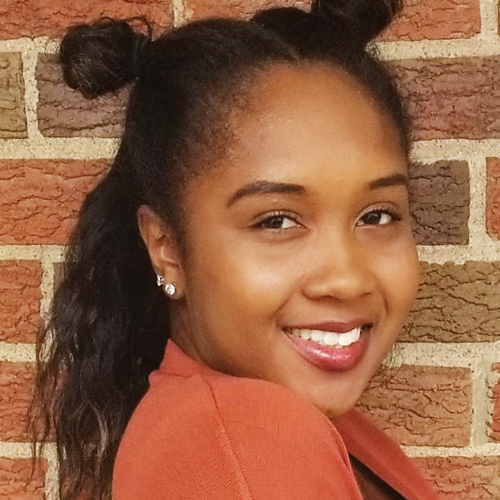 Khija Minneyfield | Lead Facilitator (K-2), Vineyard Columbus After School Program, Westerville, Ohio
Khija Minneyfield | Lead Facilitator (K-2), Vineyard Columbus After School Program, Westerville, Ohio
I am most proud that I have been able to change the life of even one child through my position in the afterschool program. These kids are my world and all I want more than anything is to make a difference in their lives and to set them up academically, spiritually, emotionally and socially to become the best version of themselves as they grow up.
I have been able to see my kids grow academically in areas that they struggled with the most in school. I have also been able to see the kids show off their social-emotional learning skills that we have practiced in different ways nearly every day in the classroom. Most important, I have been privileged to help and watch as my kids grow closer to God, through prayer and worship. Not only have I been privileged to see so much growth in my kids over the past couple of years, but I have also been able to see tremendous growth in my families as a whole.
Ideally, my kids will have the necessary tools to succeed in school and to feel comfortable asking for extra help when they don't quite understand. They will also have the tools to manage their emotions; make good, well-thought-out decisions; think optimistically; have good social awareness; and have growth mindsets. My kids will know where in the Bible to turn to when things are going well and where to turn when things are going poorly. My goal is to be a safe space for my kids to explore life and grow, so that in the future they can reflect on their childhood and what made them into the amazing people that they will become—and so they will think of the Vineyard Afterschool Program as a big contributor.
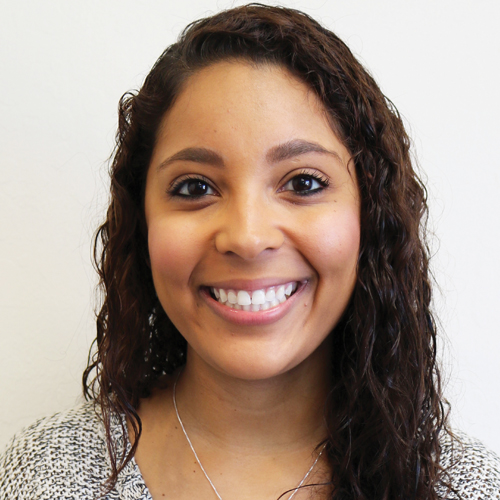 Marissa Wells-Ellis | Program Director – Camp, Mission Valley YMCA, San Diego, California
Marissa Wells-Ellis | Program Director – Camp, Mission Valley YMCA, San Diego, California
I am most proud of the departments I have worked in during my YMCA career. I started working at the Mission Valley YMCA in 2012. I began my career as a camp counselor in the Summer Camp department working as a frontline staff in the beautiful San Diego weather, never expecting this would lead to any sort of career in the Y. My program serves over 10,000 children from diverse communities each summer between its two locations. As someone who attended the program I am now the Director of, I feel fortunate to provide enriching experiences to so many young San Diegans that will impact their future in a way that will benefit our community, state and much more. I am also extremely privileged to be one of the only women of color in my field in my organization. My personal passion of advocating for other leaders of color who are emerging in the youth development field and watching those staff achieve things beyond what they believed they are capable of brings me much joy and fulfillment. It is important to continue to fight for those who are underrepresented in our organization, to show youth positive role models who look like them. I am proud to supervise a large staff team and to act as a mentor to those who may want to work in this field and those who don't. As a camp staff, you learn many skills that translate far beyond working directly with youth; I often see my staff moving into careers they have been prepared for through their work. I am proud that throughout the past couple years, I have found my voice and an outlet in my programs to advocate for those who cannot advocate for themselves.
The impact I have seen from my work is an extremely successful program that provides many different experiences for youth that they may not ever receive during their school day. The program allows youth to discover activities and hobbies they are passionate about in an environment accepting of making mistakes and building skills. We offer over 100 camps and experiences, from leadership development and community service to skateboarding and gymnastics. We pride ourselves on the fact that we have something for just about everybody and not only a specific demographic. We offer camps that are more costly and those that are more affordable. We provide scholarships and financial aid to hundreds of campers each summer, so they are not limited by their financial means. I have seen campers change their whole personality and outlook in just five days, based on their connection with their staff or the activity they participate in. We teach the importance of achievement and perseverance; I get to see the impact when campers go home each day with a smile on their face. I also see a more diverse staff team and leadership team working under me. I focused my hiring practices on intentionally bringing staff on based on values, skills and people who connect with the communities we serve. The impact of having a child look at someone who is caring for them and connect with that person is invaluable.
My ideal results would be to grow and expand the types of offerings we extend to the youth of the community, especially engaging with teens. It can be difficult growing up; through my program, I hope to provide a safe and positive space for all my youth to be exactly who they want to be. I see that some of my teens develop a sense of belonging and connection to the YMCA and their peers in the leadership program we facilitate. Through this program, we would recruit and serve even more teens, who will then bring positive leadership skills to their schools and careers. These may be the future leaders of the Y! Especially in today's climate, building relationships and connecting with a diverse group of people are important skills for children to learn. As we grow older, acceptance and respect are even more important. I would love these skills to continue to grow and become more of a forefront in my program. I hope I can continue to advocate for the up-and-coming young adults in our organization, so they can see themselves in a role like mine or even higher. I hope that through my advocacy and influence there will be a cultural shift within my organization—that prioritizes diversity and inclusion in workplaces and more equitable hiring practices for external and internal candidates.
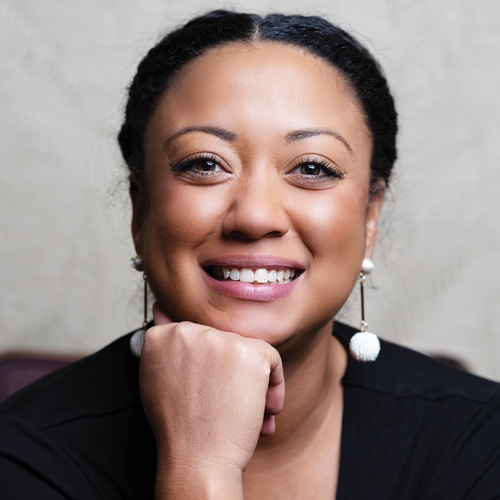 Pamela S Roberts, MSW | Director of Community Partnerships, Heart & Hand Center for Youth and Their Families, Denver, Colorado
Pamela S Roberts, MSW | Director of Community Partnerships, Heart & Hand Center for Youth and Their Families, Denver, Colorado
I am most proud of the deep lasting relationships I have formed with Heart & Hand families. I truly believe it takes a village to raise a child and I am so happy to be a part of the Heart & Hand village. Each day, I am able to be a part of that with families who are resilient, caring and love their community. I am proud to be a part of a community that shines in adversity and gives me hope for the how culturally diverse our futures can be.
The immediate efforts that take place in our programming are the tiny moments: a student realizing their full potential, sharing a hot meal with their friends, cracking that math problem or planning their own ballet show. These little moments do not seem like much, but for a child who has supportive adults in their life—that care about these moments with students—it means the world. We allow our students to be who they want to be, challenge what people think they should be, and explore all the possibilities we can provide to them.
I hope I can continue to support the community I have come to love and continue to advocate for the families who show me what strength is. I look forward to the future work with my colleagues, who are always evolving and improving afterschool programming. In 10 to 11 years, when our students walk across the stage at their high school graduation, the Heart & Hand village will be there cheering them on.
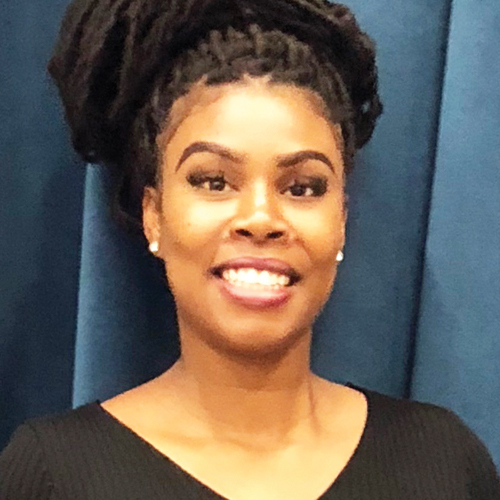 Philece C. Wilson | Site Supervisor, Bryan Hill Afterschool, St. Louis, Missouri
Philece C. Wilson | Site Supervisor, Bryan Hill Afterschool, St. Louis, Missouri
I am most proud of helping my girls build their confidence! I think it is very important that we all find the beauty and confidence within ourselves, because it helps us get up each day and conquer the world full-force! I wanted my girls to know that it does not take a million dollars to be fashionable and that they can create something from nothing.
I am also proud of the relationships that I have built with my families. I wanted to go above and beyond in assisting my parents in changing their lives, because then the youths' lives are changed. I offer employment and education resources to my families. I wanted to approach community outreach with a generational approach to improve their current circumstances. My parents are welcomed to call or text me any time of the day or night to get resources. I always let them know I am up working!
The immediate impact that I have seen from my efforts are my kiddos embracing who they are, fully! I love seeing my kiddos expressing themselves through their fashion choices and being able to be confident in their appearances.
The immediate impact that I have seen from efforts with building relationships with the families is that I am a go-to person when they need assistance—and that makes me feel honored! I am happy that they entrust time to help them as well as their children.
I hope that long term, our youth stop focusing on brands and labels and accept one another in any fashion style. I have seen so many youth isolated from their peers based on the clothing they wear—and I want that to stop. Although many schools have implemented uniforms, the accessories hold weight in making the outfits unique. I was extremely happy that I was able to teach my girls how to make beautiful bows to finish off any outfit.
Ideally, I want to see each member of the afterschool family succeed! I want grandma to go back to school or find additional employment to help with taking care of her needs, I want mom and dad get their high school diploma and enter trade school. I want my kiddos to be happy, confident and successful as well, because their family is able to provide them the necessary support to thrive!
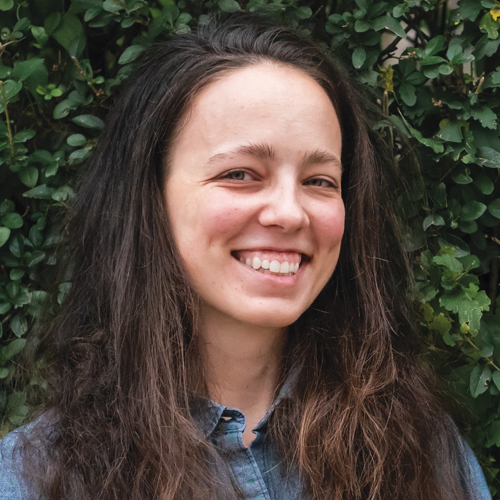 Rebecca Schedl | Specialist in Art and Outreach Coordinator for Afterschool Partnership Programming, Parent Infant Center After School, Philadelphia, Pennsylvania
Rebecca Schedl | Specialist in Art and Outreach Coordinator for Afterschool Partnership Programming, Parent Infant Center After School, Philadelphia, Pennsylvania
I am most proud of the collaborative work PIC After School has been able to do with other local educational programs. We've partnered with a number of local organizations to provide a variety of types of lessons for our children.
The most exciting thing is seeing how excited the kids are to have these novel educational experiences. My first collaboration was with University City Arts League, an arts education organization that operates right across the street from us. My background in the arts has given me a lot of experience with ceramics. Knowing how much I love it, I really wanted to bring that experience to the kids that I work with. However, it's something that requires a lot of specific and expensive equipment to deeply explore. University City Arts League has all that stuff already on hand. We had a couple of meetings to figure out how we could work together. In the end, they were able to provide space for our kids to take classes. The kids absolutely loved it. Clay is really tactile and messy, so it's very fun to build with. It gives you the option to make either sculptures or more functional work. Kids are excited to build a cup and to know that at the end of the process, they have made something they can use in their daily lives.
I'd like to continue establishing connections between local education organizations. There are so many different educational experiences out there. I think by providing a variety of opportunities, we give children a more comprehensive view of where their interests really are. I think it's also really powerful to have different organizations working together. When we work together, there are a lot more opportunities we can provide to the children we work with. When we work together, we're also a lot stronger than we are by ourselves.
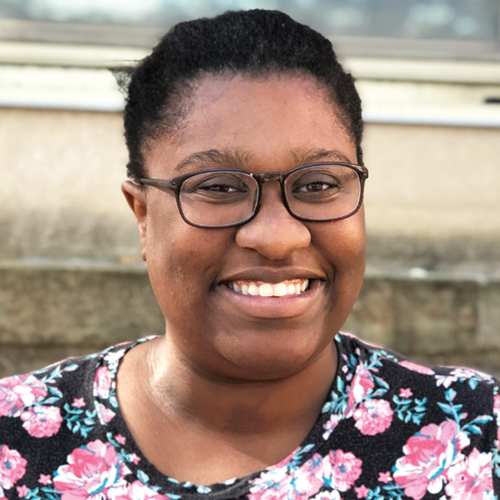 Samira Ford | Grants and Fellowships Consultant, Villanova University, Villanova, Pennsylvania
Samira Ford | Grants and Fellowships Consultant, Villanova University, Villanova, Pennsylvania
I spent much of my career working in North Philadelphia nonprofits, as I knew working in low-income areas would benefit students like me, a former student from a low-income household. I worked at a Performing Arts Training School in the afterschool program—the first time I had to structure programming around students and find out ways to cater to their experiences and needs. It was also my first encounter, as an educational professional, with reading and writing anxiety in under-resourced populations.
After working at the Performing Arts school, I moved on to work in a makerspace, where we focused on teaching local students skills like woodworking, sewing, knitting and chemistry. I set a goal to manage and run at least 20 general and 15 unique STEAM programs per month, along with one major event every two months. The events were guided by student interest, but I definitely had favorites. There was our student-hosted and -presented Photo Gallery, where I taught the kids how to use a professional camera and gave them free reign to design topics and subjects for a Gallery. I loved our Winter Festival, which had a decent turnout and gave us the chance to try a mix of wintry crafts like knitting, crocheting, and candle-making, and we even made snow globes. It wasn't until our makerspace was awarded a storytelling grant that I was confronted again with our students' aversion to reading and writing. I wrote the curriculum for this grant because I have always been a reader and consider myself a professional writer. I included prompts for storytelling and ways to engage our students through crafts and reading, but what I found was disheartening: It was not the avoidance of reading that was frustrating to learn, it was my students' love of storytelling. I decided my next goal was to find a way to bridge their inherent passion for storytelling to encourage reading for enjoyment, which naturally leads to improved literacy.
My early programs started with mostly oral literacy, where I listened to kids tell their own stories and prompted them for details and metaphors. I asked their parents about their upbringing and experiences. I needed to address the anxieties around reading and writing "properly" and become the space where the focus was not correctness, but engagement. I wanted diverse peoples who lived like I had to read more, write more and find a way to tell their own stories without the weight of discouragement because of the lack in resources provided to build their confidence in their literacy. That was how I decided to start a nonprofit.
Being accepted into a Master of Education program was a giant step toward my goal to start a literacy mentorship nonprofit. I had always hoped to offer my services completely free to Philadelphia schools and libraries, to give students around the area unbarred access. I currently spend my energy helping English language learners understand and fill out college applications, in addition to starting a leadership program with a few kids and teens I have worked with in the past. I do this all in addition to my grants and fellowships consulting at Villanova University, as a part of its Center for Research and Fellowships. I have traveled nationally for consultations, presented my programs to grant-holders, and led workshops for major citywide organizations. In the spring, I hope to move from college readiness to workforce readiness and find ways to encourage literacy in teens through practical life experiences.
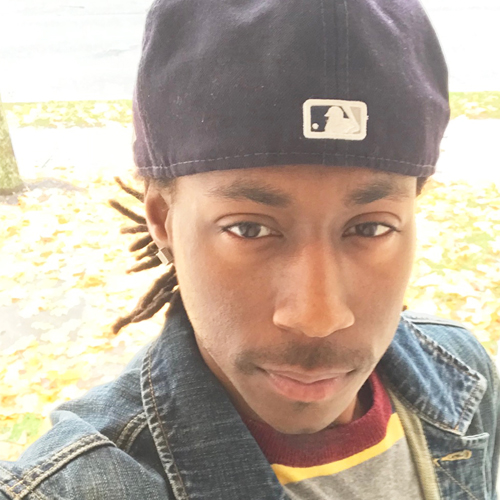 Sequan Redmond-Petty | Site Director, YMCA Albany New York Branch for New Scotland Elementary, Albany, New York
Sequan Redmond-Petty | Site Director, YMCA Albany New York Branch for New Scotland Elementary, Albany, New York
I am most proud of being able to make an impact on all my children while they're in program and making sure I'm passionately taking on all my children's interests and displaying anything that they feel they enjoy.
Some immediate impact that I have seen was one of my children, by the name of Dooley Harrington, who really did not have interests in staying in program for a long period of time. I planned an activity for the month of November, which was a Dunkin' Donuts coffee shop prop box using our recycling materials such as cardboard, et cetera. When Dooley was being picked up, he asked to show his mom the beginning phase of the activity and asked his mom to stay late for the very first time—and that made me very pleased and happy to experience, as well as his mother being excited.
Long term I am planning on possibly moving up the chain of command for childcare in general or working on my own childcare organization, so I can continue making a positive outlook and impact for all children.
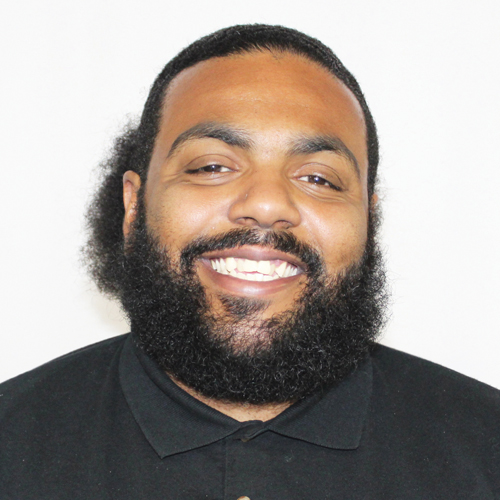 Steven Austin | Teen Center Director, Boys & Girls Club of Pasadena, Pasadena, California
Steven Austin | Teen Center Director, Boys & Girls Club of Pasadena, Pasadena, California
I am most proud of understanding my privileges, the oppression that my community is facing, and the power that I have to effectively make a difference. Being able to accept these realities, I now value the importance of strength-based Leadership in developing myself, my team and my community.
I have been able to see the development of mentors in our community that help reinforce the value of learning and supporting youth by creating safe spaces for youth to thrive.
The long-term, bigger pictures results are, ideally, to help influence the future of leadership development by motivating, engaging, and empowering people to become everyday leaders through self-reflection and skill development.
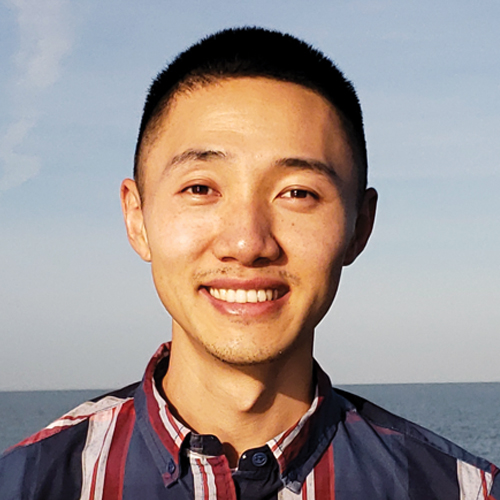 Steven Cong | Program Manager / Director of Leadership Development, Public Allies Silicon Valley / San Francisco, California
Steven Cong | Program Manager / Director of Leadership Development, Public Allies Silicon Valley / San Francisco, California
I am most proud of the fact that I held space for folks in so many different organizations, serving youths in so many ways, with engaging important conversations around how to best serve those who are most underserved in our communities. Preparing for trainings can feel like preparing for a coin toss, because there can be so many variables that are hard to plan for. I can walk into an agency not knowing what kind of personalities will be in my audience and not knowing how the group I'll share two hours with might respond to the curriculum I'll facilitate. It can be stressful—and a stray yawn from one participant can feel much more serious than it really is. However, the trainings always end, and the evaluations always come in. I feel more surprised than I should be by the fact that each time I read my evaluations, I feel affirmed.
Whether it's the staff who shared that they now have tools they can use at their site or the agency representative who shared that the training was exactly what they were looking for, it brings me pride to know that I supported someone else in the field with doing the work that helps our communities thrive. It shows that the immediate impact of the work I do is evident each and every time I put in the effort to provide a quality training. One agency representative even told me that the Power and Privilege training I co-led was the best rendition of a training on that topic she had ever experienced. She then wanted to meet with me and discuss how to incorporate more of an emphasis on social justice into their agency's culture. This is the kind of feedback and impact that keeps me going!
I hope our work would enable afterschool professionals and organizations serving youths in the Bay Area to foster an environment in which their youths always know that they are working with folks who can understand them, meet them where they're at, and support them in ways that are equitable. CalSAC's curriculum emphasizes equity in how and through whom power flows, and it unpacks the way privilege facilitates inequity. The curriculum also explores the way these structural factors affect how youths show up in spaces we co-create, and it emphasizes the importance of communication styles that make space for youth to engage on their own terms. This combination of the structural and the individual is what will lead to broad change over a long period of time. I hope that as CalSAC's trainers share its curricula with agencies around California, youths in afterschool programs will always have a counselor/advisor/mentor who knows what it means to make them feel seen and who are aware of what kind of policies and institutions enable their holistic growth.
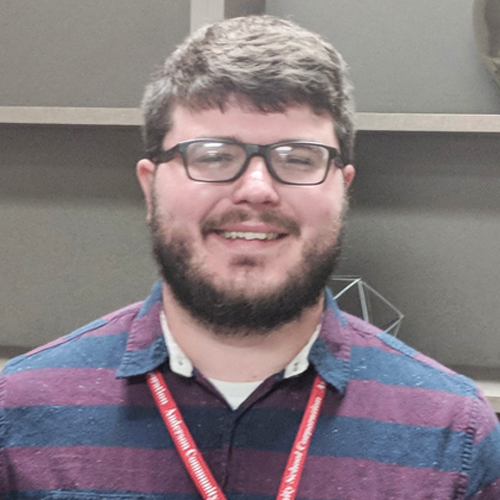 Weston Bell | Data and Technology Specialist, Anderson Community School Corporation, Anderson, Indiana
Weston Bell | Data and Technology Specialist, Anderson Community School Corporation, Anderson, Indiana
I'm really most proud of just seeing how much our program has grown and how many more kids we are able to help because of it. I've had the opportunity to help build our afterschool program from its inception and I remember the struggles we had with our attendance and activities in our first year of programming. We've been able to take all of the challenges we've encountered in stride; today we serve over 800 students through a variety of enriching and exciting afterschool activities that cater to the interests of a very diverse group of students. All the while, under my supervision, our program has become very technologically integrated and efficient, which allows us to spend more time and resources on our primary goal; serving our students. I couldn't be more proud of our program and my contributions to it.
It's obvious that our presence in the schools we work in has improved student engagement and excitement throughout the entire day. We've also seen much-improved attendance and grades among the students who participate in our program, which is a high percentage of the overall student population at both of our schools. Anecdotally, I would say that the culture we provide in our afterschool programs has been a major factor in improving both student-student and student-staff relationships at both schools as well. Our mission has always been to provide a safe and engaging space for students during afterschool hours, especially to those who do not have access to an environment like that elsewhere. In light of our measurable accomplishments, I would say we have been successful.
My greatest hope for the program is simply that we're able to expand the model we have in place to encompass more of the schools and students within our corporation through the addition of new sites and activities. The effect we've had on our schools has been undeniable—so the more places and students we can impact, the better. Our program model and our data model are both very flexible and expansion is both a simple and necessary process. Our corporation has many, many students in desperate need of programming like ours, who simply don't have access to it because of our program's limited scope. My dream is to have a site in all of our schools.

